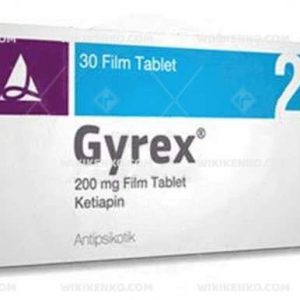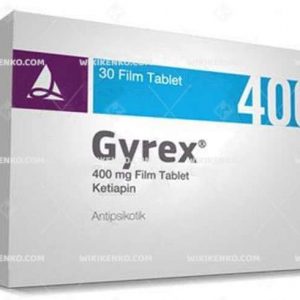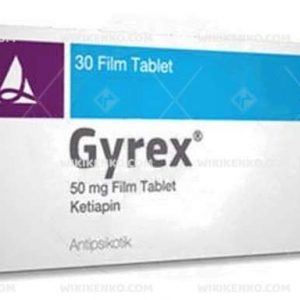Gyrex Film Coated Tablet 300 Mg
Gyrex is a film-coated tablet hailing from the pharmaceutical landscape of Turkey. This medication, crafted by Berksam, offers a ray of hope for individuals grappling with specific mental and mood conditions. At the core of Gyrex lies Quetiapine, an atypical antipsychotic known for its intricate interaction with a diverse array of neurotransmitter receptors.
| Dosage form | |
|---|---|
| Pack size | |
| Potency | 300 Mg |
| Manufacturer | |
| Origin | |
| Generic Name (Ingredient) | Each Film Tablet Contains 300 Mg Of Quetiapine Base (345.39 Mg As Quetiapine Fumarate). |
Assuming your emergency circumstances for this product, visit Urgent Quotation page. Besides, for any pharmaceutical questions, please ask us in the comments section.
Description
Mechanism of Action
Understanding the efficacy of Gyrex begins with unraveling the mechanism of action of its active ingredient, Quetiapine. This multifaceted compound exhibits a noteworthy affinity for cerebral serotonin (5-HT 2) and D1/D2 dopamine receptors, along with alpha 1 adrenergic and histaminergic receptors, and alpha 2 adrenergic and 5HT 1A serotonin receptors. This intricate interplay forms the foundation of Gyrex’s therapeutic potential.
Indications and Dosage
While the source does not provide specific therapeutic indications and dosages for Quetiapine, it is a well-acknowledged remedy for addressing various mental and mood conditions. These encompass:
1. Schizophrenia:
Gyrex, with its Quetiapine content, is a valuable tool in the management of schizophrenia.
2. Bipolar Disorder:
This medication finds its niche in the treatment of moderate to severe manic episodes associated with bipolar disorder. It also plays a crucial role in addressing major depressive episodes linked to bipolar disorder.
3. Respiratory and Gastrointestinal Infections:
Although not its primary function, Gyrex has exhibited effectiveness in combating lower respiratory tract infections, such as acute bacterial exacerbation of chronic bronchitis, pneumonia, and lung abscess. Additionally, it showcases utility in the treatment of gastrointestinal tract infections, including enteric fever and shigellosis.
Administration
Gyrex tablets offer flexibility in their administration. They can be ingested with or without food. However, it’s imperative that these tablets are swallowed whole and not split, chewed, or crushed. This ensures the medication’s optimal effect and safety.
Contraindications
Gyrex is not a one-size-fits-all solution and comes with specific contraindications. It should be avoided by individuals with hypersensitivity to Quetiapine or any other component of the product. Furthermore, its concurrent use with inhibitors of the cytochrome P450 3A4 enzyme system is discouraged.
Precautions
Ensuring the well-being of individuals using Gyrex necessitates a nuanced approach. This medication should be employed with caution in various scenarios, including:
1. Elderly Patients:
Elderly individuals require special attention when considering Gyrex as a treatment option.
2. Parkinson’s Disease:
Patients with Parkinson’s disease need vigilant monitoring when Gyrex is in the picture.
3. Liver Impairment:
Individuals with liver impairment should proceed with caution and under close medical supervision.
4. Diabetes and Risk Factors:
Gyrex usage demands careful consideration in those with diabetes or predisposing risk factors.
5. Cardiovascular and Cerebrovascular Conditions:
Known cardiovascular disease and cerebrovascular conditions that predispose to hypotension require a cautious approach.
6. History of Seizures:
A history of seizures is a significant factor in the decision-making process.
7. Alcohol or Drug Abuse:
Individuals with a history of alcohol or drug abuse necessitate a tailored plan.
8. Stroke Risk Factors:
Risk factors for stroke mandate a comprehensive evaluation of the potential benefits and risks.
9. Family History of QT Prolongation:
A family history of QT prolongation underscores the need for heightened vigilance.
Gyrex Film Coated Tablet 300 Mg Side Effects
Gyrex, enriched with Quetiapine, may introduce individuals to a spectrum of side effects. These can include:
- A sensation of light-headedness, potentially leading to fainting.
- Muscle stiffness, characterized by rigidity.
- Elevated body temperature, manifesting as high fever.
- Profuse sweating.
- A state of confusion.
- Rapid or irregular heartbeats.
- Muscle tremors.
- Involuntary twitching or uncontrolled movements involving the eyes, lips, tongue, face, arms, or legs.
- A mask-like appearance of the face.
- Difficulty swallowing.
- Impaired speech.
It’s crucial to acknowledge that this list is not exhaustive, and individual responses to Gyrex may differ. Some individuals may encounter different side effects, while others may not experience any at all. The counsel of a healthcare professional is paramount for a deeper understanding of potential side effects. In case of any unexpected effects, consulting with a healthcare provider is recommended.
Onset of Action
Antipsychotic medications like Gyrex, incorporating Quetiapine, often require patience as they take time to exert their therapeutic effects. The timeline for experiencing the full benefits can vary based on individual factors such as body chemistry, the specific condition being treated, and the prescribed dosage.
In a general context, some individuals might begin to perceive the medication’s effects within the initial one or two weeks of use. Nevertheless, it may take several weeks to fully unlock the medication’s potential. It is of utmost importance to adhere to the prescribed regimen, and discontinuing the medication abruptly without professional guidance is discouraged.
Individual experiences can differ significantly, and thus, consulting with a healthcare professional is vital for personalized guidance. This article provides a general guideline, and precise information can be obtained through such consultations.
Medication Interactions
Certain medications may interact with Gyrex, and it is crucial to inform your healthcare provider about all the products you use, including prescription drugs, nonprescription drugs, and herbal products.
Alcohol and Illicit Drugs
Concomitant use of Gyrex with alcohol or illicit drugs is discouraged, as it can potentiate the medication’s side effects.
Pregnancy and Breastfeeding
For individuals who are pregnant, planning pregnancy, or breastfeeding, a comprehensive discussion with a healthcare provider is essential. This dialogue should encompass the assessment of the benefits and risks associated with Gyrex usage.
Body’s Response
The duration for the body to adapt to a medication like Gyrex can vary widely. In general, most individuals adjust to new medications within a couple of weeks. However, some medications may require a more extended adaptation period, spanning four to eight weeks. During this period, side effects that manifest initially may subside as the body acclimates.
It’s crucial to bear in mind that everyone’s response to medications is unique. Age, overall health, and individual characteristics can significantly influence the rate of adjustment to Gyrex. The guidance of a healthcare professional is invaluable in navigating this adaptation phase. It is essential never to alter medication dosage or discontinue use without the supervision of a healthcare provider.
Conclusion
In conclusion, Gyrex, encapsulating the power of Quetiapine, stands as a versatile tool in the realm of mental and mood condition management. Its intricate mechanism of action, potential benefits, and necessary precautions form a tapestry aimed at enhancing the well-being of individuals. Patience is key when awaiting the onset of action, and adherence to the prescribed regimen is imperative. The journey to well-being is a collaborative endeavor, guided by healthcare professionals and supported by the strength of medications like Gyrex.
Key Information
| Active Ingredient | Quetiapine |
|---|---|
| Mechanism of Action | Interaction with various neurotransmitter receptors |
| Indications | Schizophrenia, Bipolar Disorder, and select infections |
| Administration | With or without food, swallow whole, no splitting |
| Contraindications | Hypersensitivity to Quetiapine, CYP3A4 inhibitors |
| Warnings and Precautions | Elderly, Parkinson’s disease, liver disease, diabetes, cardiovascular conditions, seizures, substance abuse, stroke risk, QT prolongation |
| Common Side Effects | Light-headedness, muscle stiffness, high fever, sweating, confusion, rapid heartbeats, tremors, twitching, mask-like face, trouble swallowing, speech issues |
| Onset of Action | Varies, typically within the first one to two weeks |
| Precautions | Medical history disclosure, medication interactions, alcohol/illicit drug avoidance, pregnancy/breastfeeding discussions |
| Adaptation Period | Usually within a couple of weeks, but up to four to eight weeks for some |
Use the form below to report an error
Please answer the questions as thoroughly and accurately as possible. Your answers will help us better understand what kind of mistakes happen, why and where they happen, and in the end the purpose is to build a better archive to guide researchers and professionals around the world.
The information on this page is not intended to be a substitute for professional medical advice, diagnosis, or treatment. always seek the advice for your physician or another qualified health provider with any questions you may have regarding a medical condition. Always remember to
- Ask your own doctor for medical advice.
- Names, brands, and dosage may differ between countries.
- When not feeling well, or experiencing side effects always contact your own doctor.
Cyberchondria
The truth is that when we’re sick, or worried about getting sick, the internet won’t help.
According to Wikipedia, cyberchondria is a mental disorder consisting in the desire to independently make a diagnosis based on the symptoms of diseases described on Internet sites.
Why you can't look for symptoms on the Internet
If diagnoses could be made simply from a textbook or an article on a website, we would all be doctors and treat ourselves. Nothing can replace the experience and knowledge of specially trained people. As in any field, in medicine there are unscrupulous specialists, differences of opinion, inaccurate diagnoses and incorrect test results.







Reviews
There are no reviews yet.